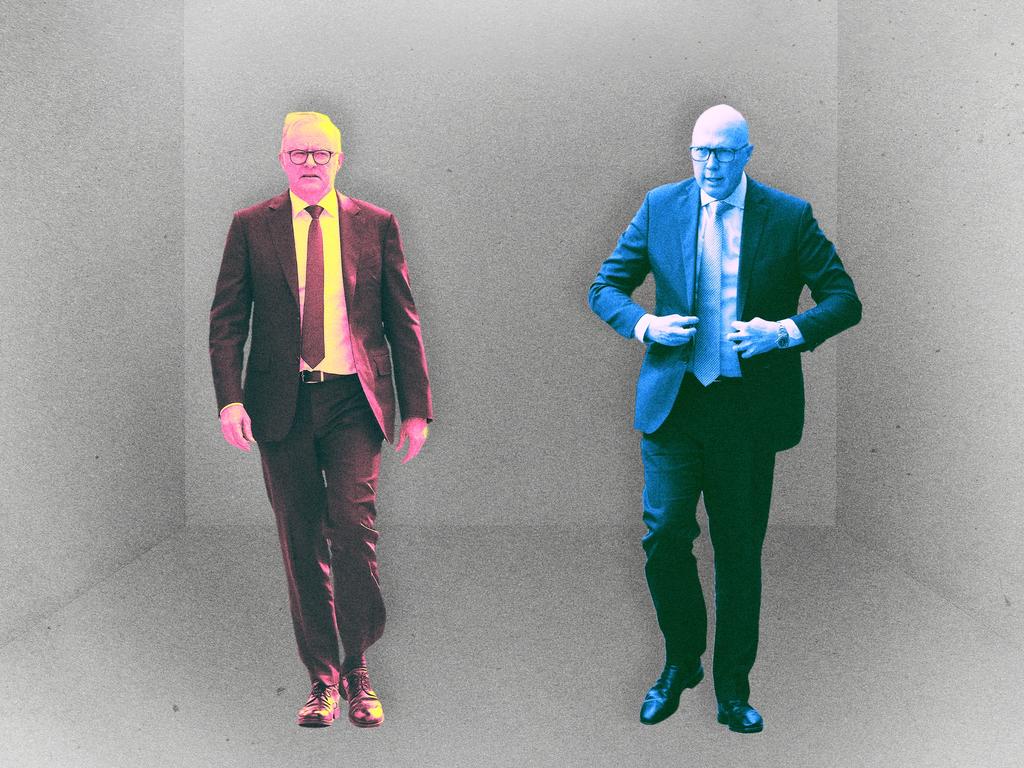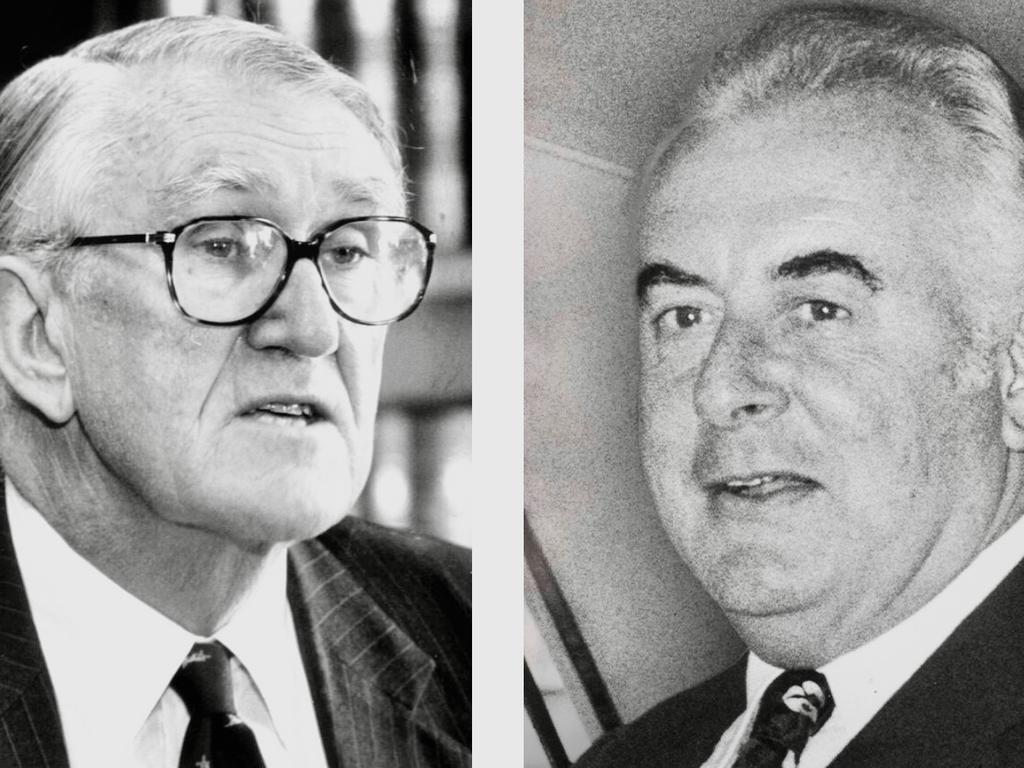Bitter politics and shallow policy: Election 2025’s leadership deficit signals dismal fate for the country
There is one certainty: neither the policy agenda of the Labor government nor of the opposition Coalition will be adequate for the numerous storms that lie ahead.
The astonishing feature of Anthony Albanese’s campaign, with polls predicting his re-election, is his “more of the same” policy agenda. Albanese is telling the public the second term of his government will merely amplify the first term. No big changes, no rethink, just status quo stability.
This is a retail politics message for a retail campaign. It is astonishing because the public has been widely dissatisfied with Labor’s first term and with Albanese’s effort as Prime Minister but every sign is that Albanese still will be rewarded. If this occurs there will be two main reasons: the abject failure of the Liberal campaign under Peter Dutton and the superior political skills of the ALP.
Election 2025 may earn an ignominious place in our history – the time when Australia, facing a world in transformation and the imperative for a recasting of its national policies, retreated into denial, timidity and introspection, leaving the impression the challenge was too hard.
The final Newspoll suggests Albanese has out-campaigned and outpointed Dutton. But minor parties and independents are rating strongly – perhaps performing even better than in 2022 – signalling deep disenchantment with major party leaders who are seen as ineffective and unreliable.
The test for Albanese is whether he might pull off a remarkable majority government re-election. The test for Dutton is whether he can collect a tolerable number of face-saving seat wins. But the tide of voting support alienated from the mainstream parties points to profound changes and challenges for effective government in Australia.
There is one certainty about this election: neither the policy agenda of the Labor government nor of the opposition Coalition will be adequate for the numerous storms that lie ahead. The politicians cannot say they weren’t told. The reality is they are prisoners of a low-expectations political system where any serious effort to seek genuine change and reform will be shot to pieces in a firestorm of self-interested negativity.
Unless this cycle is broken, Australia will slide into a trajectory of decline. The leadership deficit in the country is apparent in this campaign. In truth, neither side has a national interest manifesto that warrants their victory at this election – a truly dismal fate for the country.
This is a period of historic challenge for Australia – it faces a prolonged productivity and living standards slump, weak economic growth, an uncompetitive economy outside resources, chronic deficits and debt, unprecedented strategic dangers, a bungled energy transition and a looming demographic time bomb. Yet this campaign, with a couple of exceptions, has chosen to ignore our challenging future for short-term and glib improvisations.

The campaign has entrenched Labor’s political identity for the 2020s and exposed the Coalition’s lack of firm identity. And that’s a double problem.
An Albanese victory, if the polls are accurate, will affirm Labor as a party of high spending, chronic government intervention, high taxation, ambitious social agendas, biased towards free service delivery, pro-union, pro-renewables and pro-identity politics. On balance this is not a viable agenda for Australian success in the rest of the 2020s.
Any majority victory for Albanese will strengthen his authority as Prime Minister, constitute an immense personal achievement and vest Labor with a possible third-term government and the opportunity to put its values and ideological stamp on the country for the rest of the decade.
While the Dutton agenda offered more hope for economic reform, the Coalition’s game plan has been unpersuasive in its caution (the troubled idea of nuclear power aside), its lack of bold policy, lack of preparation, its delays and its belated and flawed policy releases. The sheer extent of Liberal Party underperformance is astonishing. The fear for the Liberals is election 2025 being a repeat of election 2022.
Underneath the Coalition’s scramble over policy is a deeper malaise – the lack of conviction. The Liberal Party of John Howard and Peter Costello is retreating before our eyes. The Liberals have failed to address the core cultural and structural problems revealed in their May 2022 defeat under Scott Morrison.
Whether the Liberals are in government or opposition after this election, they will fail at their tasks until they have the long-deferred internal debate to sort their identity and purpose in the 2020s and produce more considered and robust policies.
The Liberals misread the nation. They convinced themselves Albanese would slide out the backdoor and they forgot the golden rule of deciding what you believe and devising policy to project that belief. Their brand is tarnished. Their policies were riddled with contradictions – standing for lower tax but opposing Labor’s tax cut; opposing Labor’s IR laws but retreating from their removal; attacking Labor’s deficits but offering a weak “bottom line” response in reply.
Any Labor victory will come more from clever politics and massive revenue windfalls than genuine policy advances. For Albanese Labor, the era of Hawke-Keating market and productivity-based reform to deliver their famous “growth with equity” successes is long dead.
There is no denying that a Labor win would be a singular electoral feat after seven quarters of negative GDP per capita pointing to an unprecedented retreat in Australian living standards. Yet the risk – staring us in the face – is that Labor will misread the meaning of any election victory thinking “more of the same” will do the job when it obviously won’t.
Labor’s legitimacy as a re-elected government depends on delivering its core pledge – reviving economic growth not just through immigration but also productivity gains, thereby delivering sustained increases in household living standards and private sector investment.

The risk for Labor is failing this job – being poleaxed on the trio of escalating income tax via bracket creep, chronic spending and deficits, and faltering productivity that means subpar growth.
Campaign 2025 has been conducted in a fog of disillusionment, lies, confusion and trivia. Both Albanese and Dutton have struggled to improve on their low primary votes from the 2022 poll and are hostage to preference flows that will decide the outcome.
This campaign has been about the symptoms of our problems – not the real problems. Plugging cost-of-living pain with energy rebates, fuel excise cuts and one-off tax breaks are fixes the public eventually pays for by higher deficits, higher taxes or spending cuts. Making this the test of electoral success was a gross deception.
The destructive paradox of our politics is on full display – having Labor and Coalition primary votes in the low to middle 30s induces a caution in the major parties lest they fall further, yet such caution only weakens their claims to strong government, thereby boosting further the independents and minor parties. It is a repeating cycle of gloom and distrust.
The risk for the major parties with their institutional anchors is that the country is moving away from them. That’s driven by the culture. But cultural change bears no necessary relation to effective government.
Having more diversity in parliament outside the main parties may be good, but it doesn’t equate to better government. Indeed, minority government in the House of Representatives probably means weaker government, though if Albanese just slides into minority the damage is probably limited.

The truth is, most of the minor parties and independents succeed because of alienation from the system, often justified – yet they rarely have answers to the nation’s problems and possess little ability to contribute to more effective government.
Exposing the fraud in our energy politics has been advanced in this campaign. The energy transition with its utopian targets and green moralism will occur only with higher power prices. This truth is now seeping into electoral consciousness; witness the humiliation of Albanese’s 2022 pledge to lower power bills by $275. The debate is shifting – the reality of a “renewables-dominant” model, with its infrastructure and reliability demands, guarantees overall higher costs inherent in that system. This is the trap facing Albanese Mark II.
The election has missed utterly the meaning of Donald Trump and the world he wants. Sure, Dutton misread the Trump factor and Albanese deftly exploited Trump against Dutton. It’s hard for the Coalition because its voters include Trump addicts and Trump haters.
But the bigger Trump message is as a catalyst for a world being transformed. For Trump, “Making America Great Again” equates to withdrawing the US from its global leadership role in strategic and economic dimensions.

That will shake the foundations of Australia’s security dependence on the US and its reliance on the disappearing so-called globalised rules-based order. Australia is about to have deeper responsibility and maturity imposed on it. Our great US ally is going to be less reliable but more demanding. Trump will open the door to Beijing’s regional ambitions, leading to a tougher existence for Australia. The imperative for Australia will be greater self-reliance, still operating within the US alliance but rapidly increasing its defence budget.
The suspicion is that the public and most of our elites are psychologically unready for this task. It means prioritising a strategic response that will involve most of the community in a way today’s Australians have never experienced. It will unleash new domestic political tensions – the ground is laid in this campaign for a major political split between Labor and the Coalition over defence and strategic policy in relation to China, defence spending and foreign policy.
A feature of the campaign has been Labor, stubborn and in denial about the new reality. It mouths the rhetoric of a more dangerous world but doesn’t act on what it says. Its insistence that 2.3 per cent of GDP on defence in a decade will meet our needs verges on the irresponsible, is rejected by most defence analysts of both right and left, and risks betraying Labor’s heritage.
As for the Coalition, in the dying days of the campaign it unveiled a major strategic shift and difference with Labor, pledging 2.5 per cent of GDP on defence in five years and 3 per cent in 10 years. This probably made no different to the result. Most of the media accepted Labor’s framing that strategic issues were largely irrelevant. They seem besotted by Trump and reluctant to accept the consequences of Trump.
Labor’s central scare – that the Coalition would cut government services, cut Medicare or even dismantle Medicare – reveals the depth of electoral resistance to spending reductions and urgently needed public sector reform. With stacks of cost-of-living pain, the electorate has no interest in claims the nation is living beyond its means. Indeed, the public is saddled with expectations that cannot be sustainably delivered in current fiscal settings.
The constituency for deficit and debt reduction and public sector reform seems almost non-existent – yet the potential for Labor to exploit Medicare against the Dutton Liberals seems almost limitless, endemic to the Liberal brand and impervious to Dutton’s funding pledges and assurances. But it is not just social policy where the Coalition was penalised.
Surveys show that Dutton’s lead over Labor in the critical areas of economic management, tax policy and cost of living eroded substantially as the campaign advanced, revealing a faltering performance in areas of traditional Liberal Party strength. This points to a deeper problem: cultural changes in the country put more emphasis on compassion politics, service delivery and government paternalism, and that means more resistance to a Liberal agenda of tax reform, smaller government, lower deficits and deregulated industrial relations.
The Liberals are culturally isolated but seem unable to engage at the cultural level. In this campaign Dutton seemed to shun any major cultural agenda yet Labor was vulnerable on vital culture-based issues, the single most important being our declining school performance and an overloaded and hopelessly long curriculum – issues that should be addressed given every family with kids is affected. The work and research has been done; the campaign is loaded and ready. But it wasn’t fired.
Sadly, it seems the Coalition’s victory at the voice referendum – a tribute to Dutton’s judgment – misled the party into thinking traditional values were being revived when that revival depends on issue-by-issue political campaigning and winning the battle of ideas.

The white elephant in the Liberal campaign was nuclear power. It is a proven power source but the Coalition has yet to show how it works in Australia. Nuclear power needs bipartisanship and is stymied by state and federal laws that outlaw nuclear and won’t be repealed just because the Coalition might win an election. The difficulty in this transition was highlighted by the Coalition’s proposal for government ownership and fraught debate about the costs with Labor’s successful exploitation of the $600bn price tag, one of the big lies of the election.
At the National Press Club this week Albanese performed as an assured frontrunner, his guiding mantra being: “No one held back, no one left behind.” It is reflected, above all, in his dubious claim 90 per cent of GP visits will be free by 2030. His compassion agenda builds on the first term – more funds for Medicare, cheaper medicines, cutting student debt, the budget tax cut shaving the lowest rate from 16 to 14 per cent, moving towards universal childcare, support for working from home, more renewable energy, supporting first-home buyers into the market and more industrial relations changes to buttress worker rights.
It is a deeply old-fashioned Labor agenda relying on state power. There is almost no discussion of Australia’s economic future or an economic growth strategy, no effort by Albanese to elevate economic reform and barely any discussion of productivity – now running for a full decade at the lowest rate for 60 years.

This week’s election costings from both sides revealed a complacency before a decade of budget deficits. Labor made a calculation about this campaign – that it could spend big without being penalised – and that has surely been vindicated. Albanese Labor has increased government spending as a share of GDP to record levels and at the fastest rate since the Whitlam government, with debt forecast to top $1.2 trillion down the track. Its two budget surplus were delivered by windfall revenue gains.
The Coalition at least preserved a modicum of credibility, forecasting a modest $14bn better budget across four years and a $40bn reduction in gross debt and a set of rules, spending growth to be lower than economic growth and a tax-to-GDP limit. But the Coalition’s bottom line is $8bn worse than Labor’s across the first two years and opposition Treasury spokesman Angus Taylor provides no timetable for the Coalition to return to budget surplus.
The reality is that the Coalition, to a large extent, duplicates much of Labor’s spending.
Every sign is that election 2025 will be conspicuous because the campaign mattered. If the polls are right, Labor has achieved a remarkable turnaround since February and during the campaign. This suggests when the public focused on the comparison – Albanese v Dutton – they went for Albanese.
Remember, however, the enduring myth of election 2025 – that Australia doesn’t need to change fundamentally or reset its core policies. In truth, the nation is frustrated. It wants something better. It is unsure of what that needs to be – but it knows the main parties have fallen short.







